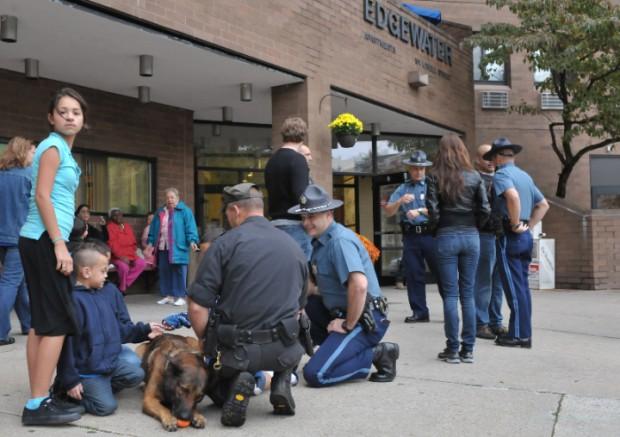Military’s Counter Insurgency Strategy — C3 Policing — a Success in Massachusett
C3 Police Officers Interact with North End Residents (Photo: MA State Police)
Deputy Police Chief John Barbieri drives through Springfield, Massachusett’s North End neighborhood in his cruiser. Several years ago, a Puerto Rican gang had a violent stranglehold on this largely Latino community. In one week there were three murders, including a gun battle in a hospital parking lot. It was like something out of a movie.
And Barbeiri said he was desperate. In large part because he couldn’t get people in the community to talk to him.
“I’ve worked in this neighborhood off and on in the heydays of community policing, as a gang intelligence officer, as a detective, in narcotics and I’ve never been able to foster any type of long term commitment in this neighborhood. I get one or two people that will talk to me but the majority of residents are afraid, inured or apathetic.”
Army Major Kevin “Kit” Parker said getting rid of the bad guys isn’t rocket science.
“The business model of insurgents in Afghanistan and the business model of gangs in the inner city in the United States is the same. It’s the same business model and I know counter insurgency can work if properly applied,” he said.
Parker, a Harvard professor and army reservist, served two tours in Afghanistan. About three years ago he joined forces with other vets, who also happen to be Massachusetts state troopers, and developed what they call “Counter Criminal Continuum” or C3 policing, a combination of aggressive arrests combined with equally aggressive community relations. They used the north end of Springfield as their test case.
What happens, he said, is that gangs seek out and set up shop in failed communities. And local residents are paralyzed by fear and afraid to speak to police.
Deputy Chief Barbieri said the officers’ commitment and presence transformed the way residents saw the police.
“I used to drive down the street I used to get suspicious looks,” he said. “The change in their attitude… I get people that wave to me want to talk to me say hello now. the joke is they wave at me with all their fingers not just one.”
Key to C3 policing is getting locals to buy into it. To do that, the state troopers hold monthly meetings with community leaders modeled on the Shuras that military guys hold with village elders in Afghanistan.
As many as 25 local officials and activists show up. They discuss everything from ways to deter drag racing to dealing with kids who smoke pot in the hallways of housing developments. The leaders are people like Jose Claudio, the director of the New North Citizens Council is amazed at the relationship that’s grown between the community and the cops.
“And thank God that we have the good relationship with them and that really I think that it’s going to keep going,” Claudio said. “Lately if you see our meetings it’s more focused on the community and the Springfield police doing a lot of the work.
C3 may sound like “community policing,” but Deputy Police Chief Barbeiri is adamant that C3 works far better. Community policing was based on grant-funded, specialized units. When the money dried up, often the community policing units went away too.
What C3 does is get the local beat cops involved, in both the arrests and community relations. So when the C3 guys go away, the program continues.
Kit Parker, ever the Harvard professor, wasn’t content to accept anecdotal evidence that his program was working. So he brought in his students to measure what he calls “the efficacy of the work.”
They looked at lots of things, big and small: murders, graffiti, teen pregnancy—anything that might be changed by getting gangs off the streets. Parker says one of the most hopeful discoveries was that North End students were doing better in school.
“If you have a kid who lives in a rough, violent neighborhood,” Parker said, “they are the conduit to export this violent to other schools. And what we found is that kids in the North End were behaving better when they went to other schools.
The success of C3 policing in the North End has motivated local law enforcement to try it in other parts of the city. And the C3 creators have received dozens of requests from people across the country who want to start the program in their communities. Parker knows how hard it is to turn a community around, whether it’s full of gangs or insurgents.
“I don’t know what’s going to happen in Afghanistan with that counter insurgency but I do want to win one war in my life. I didn’t fight in Iraq I fought in Afghanistan. I want to win one counter insurgency it may be that the North End of Springfield is the closest I get to participating in a victory.”
60 Minutes Counterinsurgency Cops: Military tactics fight street crime
Our coverage reaches millions each week, but only a small fraction of listeners contribute to sustain our program. We still need 224 more people to donate $100 or $10/monthly to unlock our $67,000 match. Will you help us get there today?
